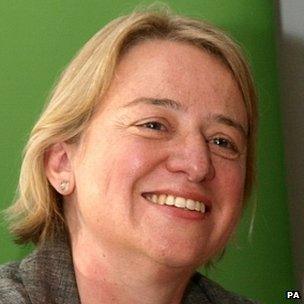Green Party activists witness leadership handover
- Published

Natalie Bennett told activists she backed 20 mile-an-hour speed limits in residential areas
The conference of the Green Party of England and Wales has a rather different feel to the bigger political shindigs later this month and next.
No burly security men making an art form out of a severe facial expression. No long, snaking queues through airport style security.
Name badges are often handwritten, activists scurry around armed with posters and bits of adhesive.
If you are after a bacon burger for your tea, you'll go hungry. Chickpea and cashew nut korma features, amongst others, on the vegetarian only menu.
More on the party's menu of policy offerings in a moment.
Day one of this conference was all about the centrepiece occasion, one leader handing over to another. Caroline Lucas, the party's first MP, the party's first solo leader, becoming the party's first former leader.
The Greens used to have so-called principal speakers. A couple, even several people running the show at the same time.
Minnows in the pond
That was deemed useless in an era where a single figurehead was useful to project the party through the media.
Caroline Lucas was that first figurehead.
She signed off with the political equivalent of a to-do list ticked off.
Her election as the MP for Brighton Pavilion was an undoubted breakthrough, she said, but for her, an advance in her patch in local government was more significant.
"Perhaps the greatest change, the sign of our coming of age, has been to become the administration on Brighton and Hove City Council," she told activists.
"That wasn't a protest, or a niche vote. That was about a whole community trusting the Green Party to look after the schools where they send their kids, provide meals on wheels, to help create much needed local jobs."
But, to herald that advance -- of running something, running anything - is an indication the Greens remain minnows in the political pond.
After a protracted debate five years ago about ditching those principal speakers and electing a single figurehead, the party has now exchanged one leader - who is prominent-ish and an MP - for another, who is neither.
'Human ecology'
The new leader is Natalie Bennett, an Australian-born former journalist from Camden in north London.
Yes, climate change was hugely important, she said, but so too was what she called "human ecology": things like wages, train fares, and food prices.
The menu of policy priorities perhaps emphasises a bit more choice than in the past.
She made her point with a powerful personal story. listened to in attentive silence.
She told the audience: "Twenty-three years ago I was in a car crash in which my mother was killed. That is a sadness shared by millions of other Britons. In just the past decade more than 27,000 people have been killed on Britain's roads.
"That's the equivalent of every man, woman and child in a town the size of Dover. Killed on our roads."
Natalie Bennett told activists she was proud that Greens were leading campaigns for 20 mile-an-hour speed limits in residential areas.
It was a deeply personal account that arguably illustrates a broader political point.
This is how the Greens want us to see them in a time of austerity: as both worldly and guardians of the planet, well aware of our day to day fears and hopes and also of what motivates most voters.
- Published7 September 2012
- Published3 September 2012
- Published3 September 2012
- Published3 September 2012